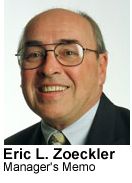 |
|
|
YOUR
COUNTY.
|
YOUR
BUSINESS JOURNAL.
|
Published September 2002
Banish
workplace blahs
by igniting leadership fire
 Q.
My department of 10 seems to be in a collective slump. If we were a baseball
team, we certainly would be in last place. Our daily routine has become
static; the entire department shows signs of complete and total boredom.
We’re making our numbers but not having much fun doing so. As a manager,
I see myself slipping into this depressing morass. Can you recommend any
proven ways to turn around such a situation?
Q.
My department of 10 seems to be in a collective slump. If we were a baseball
team, we certainly would be in last place. Our daily routine has become
static; the entire department shows signs of complete and total boredom.
We’re making our numbers but not having much fun doing so. As a manager,
I see myself slipping into this depressing morass. Can you recommend any
proven ways to turn around such a situation?
A. The managerial landscape is littered with dozens of “turnaround” fixes designed to jump-start laggard teams: TQM, team building, empowerment, 7 Habits or any other fixes de jour springing from the lofty ivory towers of business school academia.
No matter what our occupational path may be, whether we’re educators, marketing managers, production line supervisors, even firefighters, these change mechanisms often fail to achieve their promise because of the absence of one important element needed to alter the way people work: leadership.
We aren’t referring to traditional leadership, the kind that hopefully emanates from the company executive suite. Instead, we’re referring to personal leadership.
Each of us, no matter our station in life, has unique leadership qualities. Too often, however, they remain hidden, unrealized even by us.
A proponent of this theory, which he calls “Enlightened Leadership,” is Ed Oakley, a Denver-based management consultant. One of the best ways to overcome personal or collective downturns or slumps is to get in touch with your unique leadership qualities.
“Too often, we look at the boss, or the CEO, to provide the spirit to get past obstacles that challenge growth and change,” says Oakley, a former Hewlett-Packard executive. Yet, real change often occurs when a middle manager or even employees are willing to “stick their necks out, accept risks or challenge the status quo” in order to jump-start the team or department, he says.
Getting employees and lower-rung managers to recognize their own leadership talents can be daunting because of their insistence they are leadership deficient. Yet, go into any workplace, and for all the people there “just doing their jobs,” or afraid to stand out, you’ll find them “running the town’s Little League, heading up the church council, the PTA or their condo association,” Oakley says.
To illustrate, Oakley begins his workshops with the story of a police officer and a prisoner.
The officer, a captain with the Colorado State Patrol, arrives at a state prison to give a training session to guards. As the officer tugs on the obviously locked conference room door, a trusty swabbing the floor nearby drops his mop and says, “I think I can help.” And, he continues, “Your people will want coffee when they get here, right?”
With that, the prisoner runs off, returning a few minutes later with the key and the coffee. Oakley pauses for effect, then asks: “Wouldn’t it be wonderful if everyone in our organization would respond like that prisoner?”
There are many components of personal leadership qualities — being a good listener, an effective communicator, a visionary, supportive, enthusiastic, flexible, approachable, trustworthy, honest, caring, reliable, calm under pressure and having a sense of humor.
Oakley is convinced that each of us can identify at least three leadership qualities that are among our strengths and another three that are our weaknesses. Emphasize the strengths and eliminate any consideration of the weaknesses, and true change can be accomplished, he says.
When the Colorado State Patrol embraced this “Enlightened Leadership” thinking, it allowed lower-rank road officers to engage in command-level decision-making rather than deferring decisions to their supervisors. The patrol stopped counting citations issued and started counting how many motorists troopers assisted, including the speeders and intoxicated drivers that endangered others.
Getting your department members to identify their individual leadership strengths and bring them to bear on what they do at work may go a long way in changing the office environment for the good.
Eric Zoeckler operates a marketing communications firm, The Scribe, and writes “Taming the Workplace,” which appears Mondays in The Herald. He encourages your questions or comments by e-mail to mrscribe@aol.com.
© The Daily Herald Co., Everett, WA








